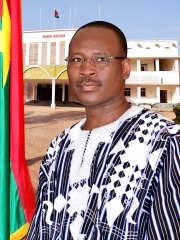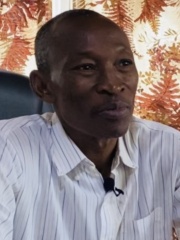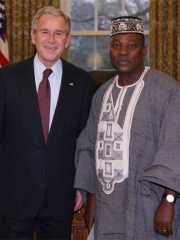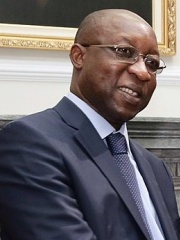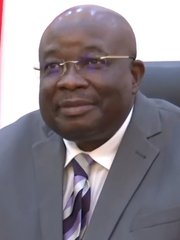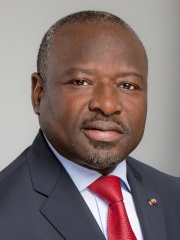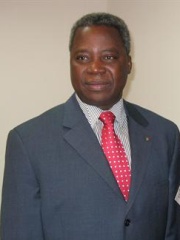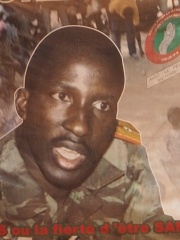
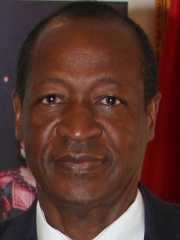
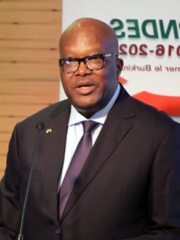
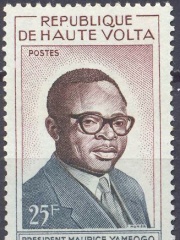
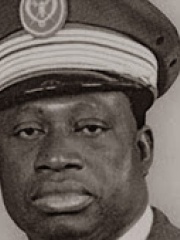
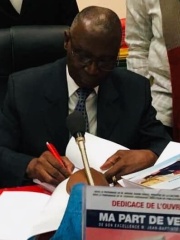
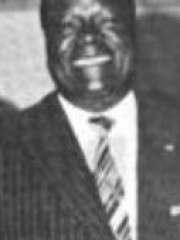
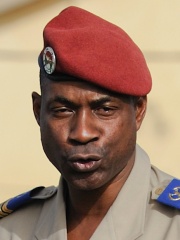
The Most Famous
POLITICIANS from Burkina Faso
This page contains a list of the greatest Burkinabe Politicians. The pantheon dataset contains 19,576 Politicians, 17 of which were born in Burkina Faso. This makes Burkina Faso the birth place of the 125th most number of Politicians behind El Salvador, and Chad.
Top 10
The following people are considered by Pantheon to be the top 10 most legendary Burkinabe Politicians of all time. This list of famous Burkinabe Politicians is sorted by HPI (Historical Popularity Index), a metric that aggregates information on a biography's online popularity. Visit the rankings page to view the entire list of Burkinabe Politicians.

1. Thomas Sankara (1949 - 1987)
With an HPI of 73.06, Thomas Sankara is the most famous Burkinabe Politician. His biography has been translated into 82 different languages on wikipedia.
Thomas Isidore Noël Sankara (21 December 1949 – 15 October 1987) was a Burkinabé military officer, Marxist and Pan-Africanist revolutionary who served as the President of Burkina Faso from 1983, following his takeover in a coup, until his assassination in 1987. After Sankara was appointed Prime Minister of the Republic of Upper Volta in 1983, he had political disputes with the sitting government that resulted in his eventual imprisonment. While he was under house arrest, a group of revolutionaries seized power on his behalf in a popular coup later that year. At the age of 33, Sankara became the President of the Republic of Upper Volta and launched an unprecedented series of social, ecological, and economic reforms that were part of what he referred to as the people's democratic revolution. In 1984, Sankara oversaw the renaming of the country as Burkina Faso ('land of the upright people'), and personally wrote its national anthem. His foreign policy was centered on anti-imperialism and he rejected loans and capital from such organizations as the International Monetary Fund. However, he welcomed some foreign aid in an effort to boost the domestic economy, diversify the sources of assistance, and make Burkina Faso self-sufficient. His domestic policies included famine prevention, agrarian expansion, land reform, and suspending rural poll taxes, as well as a nationwide literacy campaign and vaccination program to reduce meningitis, yellow fever and measles. Sankara's health programmes distributed millions of doses of vaccines to children across Burkina Faso. His government also focused on building schools, health centres, water reservoirs, and infrastructure projects. He combatted desertification of the Sahel by planting more than 10 million trees. Socially, his government enforced the prohibition of female circumcision, forced marriages and polygamy. Sankara reinforced his populist image by ordering the sale of luxury vehicles and properties owned by the government in order to reduce costs. In addition, he banned what he considered the luxury of air conditioning in government offices, and homes of politicians. He established Cuban-inspired Committees for the Defense of the Revolution to serve as a new foundation of society and promote popular mobilization. His Popular Revolutionary Tribunals prosecuted public officials charged with graft, political crimes and corruption, considering such elements of the state counter-revolutionaries. Amnesty International criticised his government for alleged human rights violations, such as arbitrary detentions of political opponents. Sankara's revolutionary programmes and reforms for African self-reliance made him an icon to many of Africa's poverty-stricken nations, and the president remained popular with a substantial majority of his country's citizens, as well as those outside Burkina Faso. Some of his policies alienated elements of the former ruling class, including tribal leaders — and the governments of France and its ally the Ivory Coast. On 15 October 1987, Sankara was assassinated by troops led by Blaise Compaoré, who assumed leadership of the country shortly thereafter. Compaoré retained power until the 2014 Burkina Faso uprising. In 2021, he was formally charged by a military tribunal with the murder of Sankara and found guilty.

2. Blaise Compaoré (b. 1951)
With an HPI of 67.39, Blaise Compaoré is the 2nd most famous Burkinabe Politician. His biography has been translated into 62 different languages.
Blaise Compaoré (French: [blɛz kɔ̃paɔʁe]; born 3 February 1951) is a Burkinabé politician and former military officer who served as the second president of Burkina Faso from 1987 until his government was overthrown in 2014. The longest-serving president in Burkinabé history, Compaoré previously served as the Minister of Justice from 1985 to 1987. Born and raised in Ziniaré, Compaoré joined the Burkina Faso Armed Forces (then known as Upper Voltan Armed Forces) at the age of 20 in 1971 where he rose through the ranks. Compaoré was a close associate of his predecessor and the country's first President, Thomas Sankara, who appointed Compaoré as Minister of Justice in 1985. The pair were seen as close allies until Compaoré led a coup d'état during which Sankara was killed two years later in 1987. Aged 36 when assuming office, Compaoré was the third youngest Burkinabé president, after Ibrahim Traoré and Sankara. After taking office, he introduced a policy of 'rectification', overturning the leftist policies pursued by Sankara. In 1989, he founded the Organization for Popular Democracy – Labour Movement (ODP–MT), which merged with twelve other political parties to create the Congress for Democracy and Progress (CDP) in 1996. Compaoré won elections that were not considered free and fair in 1991, 1998, 2005, and 2010. Compaoré's attempt to amend the constitution to extend his 27-year term led to the 2014 Burkinabé uprising, leaving him to resign and flee to the Ivory Coast. In April 2022, he was sentenced in absentia to life imprisonment after being found guilty of complicity in Sankara’s murder. Compaoré's legacy is complex, with some crediting him for stability and development, while others criticize his records on human rights, corruption and wealth inequality.

3. Roch Marc Christian Kaboré (b. 1957)
With an HPI of 65.08, Roch Marc Christian Kaboré is the 3rd most famous Burkinabe Politician. His biography has been translated into 56 different languages.
Roch Marc Christian Kaboré (French pronunciation: [ʁɔk maʁk kʁistjɑ̃ kabɔʁe]; born 25 April 1957) is a Burkinabé banker and politician who served as the President of Burkina Faso from 2015 until he was deposed in 2022. He was the Prime Minister of Burkina Faso between 1994 and 1996 and President of the National Assembly of Burkina Faso from 2002 to 2012. Kaboré was also president of the Congress for Democracy and Progress (CDP) until his departure from the party in 2014. He founded the People's Movement for Progress party that same year. Kaboré was elected president in the November 2015 general election, winning a majority in the first round of voting. Upon taking office, he became the first non-interim president in 49 years without any past ties to the military. Kaboré worked as a banker prior to his political career. On 24 January 2022, Kaboré was deposed and detained by the military in a coup d'état. After the announcement, the military declared that the parliament, government and constitution had been dissolved.

4. Maurice Yaméogo (1921 - 1993)
With an HPI of 63.10, Maurice Yaméogo is the 4th most famous Burkinabe Politician. His biography has been translated into 35 different languages.
Maurice Nawalagmba Yaméogo (31 December 1921 – 15 September 1993) was the first President of the Republic of Upper Volta, now called Burkina Faso. He proclaimed the independence of the country on August 5, 1960, and also tried (but failed) to create a union between Ivory Coast and Upper Volta. On January 3, 1966, he left the presidency due to a nationwide strike.
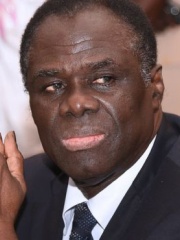
5. Michel Kafando (b. 1942)
With an HPI of 62.76, Michel Kafando is the 5th most famous Burkinabe Politician. His biography has been translated into 32 different languages.
Michel Kafando (born 18 August 1942) is a Burkinabé diplomat and politician, who served as Interim President of Burkina Faso from 2014 to 2015. He previously served as Minister of Foreign Affairs from 1982 to 1983 and as Permanent Representative of Burkina Faso to the United Nations from 1998 to 2011. Following the resignation of President Blaise Compaoré amidst the 2014 Burkinabé uprising, Kafando was chosen by the interim military administration until the next elections. Kafando was briefly ousted in the September 2015 coup attempt by the Regiment of Presidential Security, but he ultimately restored power within a week and disbanded the regiment. Elections took place shortly thereafter, and Kafando was succeeded by Roch Marc Christian Kaboré in December 2015.

6. Saye Zerbo (1932 - 2013)
With an HPI of 59.59, Saye Zerbo is the 6th most famous Burkinabe Politician. His biography has been translated into 22 different languages.
Saye Zerbo (27 August 1932 – 19 September 2013) was a Burkinabé military officer who was the third President of the Republic of Upper Volta (now Burkina Faso) from 25 November 1980 until 7 November 1982. He led a coup in 1980, but was resisted by trade unions and was overthrown by Major Jean-Baptiste Ouédraogo and the Council of Popular Salvation (CSP).

7. Jean-Baptiste Ouédraogo (b. 1942)
With an HPI of 59.15, Jean-Baptiste Ouédraogo is the 7th most famous Burkinabe Politician. His biography has been translated into 24 different languages.
Jean-Baptiste Philippe Ouédraogo (French pronunciation: [ʒɑ̃ batist filip wedʁaɔɡo]; born 30 June 1942), also referred to by his initials JBO, is a Burkinabé physician and retired military officer who served as President of Upper Volta (now Burkina Faso) from 8 November 1982 to 4 August 1983. He has since mediated a few national political disputes and operates a clinic in Somgandé. Ouédraogo received his early education in Upper Volta before joining the Upper Voltan Army and studying medicine abroad. After working in healthcare, he was appointed chief medical officer of the Ouagadougou military camp. He participated in the November 1982 coup d'état and shortly thereafter assumed the presidency. More ideologically moderate than most of his comrades, Ouédraogo did not command much popular support and governed the country amid an unstable political climate. He was for private ownership of businesses. A protracted dispute with Prime Minister Thomas Sankara resulted in his removal from power in a coup in August 1983 and imprisonment. He was released in 1985 and resumed medical work. He opened a clinic in Somgandé in 1992, which he still operates. In the 2010s, he acted as a mediator between opposing political factions.

8. Gérard Kango Ouédraogo (1925 - 2014)
With an HPI of 56.67, Gérard Kango Ouédraogo is the 8th most famous Burkinabe Politician. His biography has been translated into 19 different languages.
Gérard Kango Ouédraogo (French pronunciation: [ʒeʁaʁ kɑ̃ɡo wedʁaɔɡo]; September 19, 1925 – July 1, 2014) was a Burkinabé statesman and diplomat who served as Prime Minister of Upper Volta (now Burkina Faso) from 13 February 1971 to 8 February 1974. He was subsequently President of the National Assembly of Upper Volta from October 1978 to November 25, 1980.

9. Gilbert Diendéré (b. 1960)
With an HPI of 56.00, Gilbert Diendéré is the 9th most famous Burkinabe Politician. His biography has been translated into 20 different languages.
Gilbert Diendéré (French pronunciation: [ʒil.bɛʁ djɛn.de.ʁe]; born c. 1960) is a Burkinabé military officer and the Chairman of the National Council for Democracy, the military junta that briefly seized power in Burkina Faso in the September 2015 coup d'état. He was a long-time aide to President Blaise Compaoré, serving as commander of the Regiment of Presidential Security (RSP) during Compaoré's rule. He was appointed as chairman of the junta on 17 September 2015. Diendéré currently serves a prison sentence for his role in the 1987 killing of Thomas Sankara and the 1990 killing of Dabo Boukary.
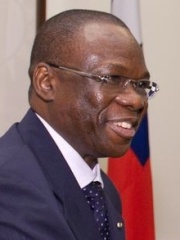
10. Luc-Adolphe Tiao (b. 1954)
With an HPI of 54.22, Luc-Adolphe Tiao is the 10th most famous Burkinabe Politician. His biography has been translated into 22 different languages.
Luc-Adolphe Tiao (born 4 June 1954) is a Burkinabé politician and journalist who was Prime Minister of Burkina Faso from 2011 to 2014.
People
Pantheon has 17 people classified as Burkinabe politicians born between 1921 and 1969. Of these 17, 12 (70.59%) of them are still alive today. The most famous living Burkinabe politicians include Blaise Compaoré, Roch Marc Christian Kaboré, and Michel Kafando. The most famous deceased Burkinabe politicians include Thomas Sankara, Maurice Yaméogo, and Saye Zerbo. As of April 2024, 1 new Burkinabe politicians have been added to Pantheon including Albert Ouédraogo.
Living Burkinabe Politicians
Go to all RankingsBlaise Compaoré
1951 - Present
HPI: 67.39
Roch Marc Christian Kaboré
1957 - Present
HPI: 65.08
Michel Kafando
1942 - Present
HPI: 62.76
Jean-Baptiste Ouédraogo
1942 - Present
HPI: 59.15
Gilbert Diendéré
1960 - Present
HPI: 56.00
Luc-Adolphe Tiao
1954 - Present
HPI: 54.22
Yacouba Isaac Zida
1965 - Present
HPI: 54.07
Apollinaire J. Kyélem de Tambèla
1958 - Present
HPI: 54.04
Paramanga Ernest Yonli
1956 - Present
HPI: 49.92
Paul Kaba Thieba
1959 - Present
HPI: 47.48
Albert Ouédraogo
1969 - Present
HPI: 46.16
Lassina Zerbo
1963 - Present
HPI: 45.49
Deceased Burkinabe Politicians
Go to all RankingsThomas Sankara
1949 - 1987
HPI: 73.06
Maurice Yaméogo
1921 - 1993
HPI: 63.10
Saye Zerbo
1932 - 2013
HPI: 59.59
Gérard Kango Ouédraogo
1925 - 2014
HPI: 56.67
Tertius Zongo
1957 - Present
HPI: 49.77
Newly Added Burkinabe Politicians (2025)
Go to all RankingsOverlapping Lives
Which Politicians were alive at the same time? This visualization shows the lifespans of the 4 most globally memorable Politicians since 1700.

